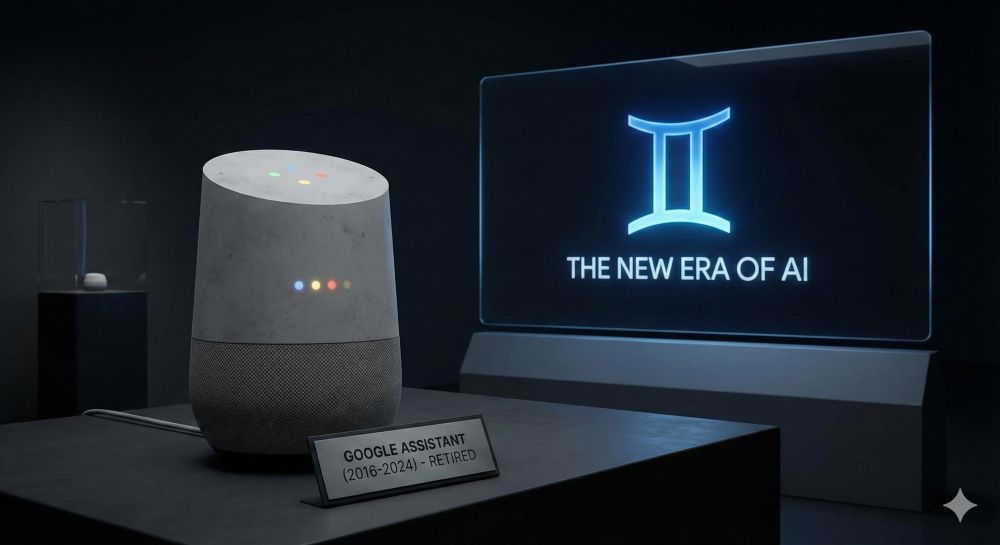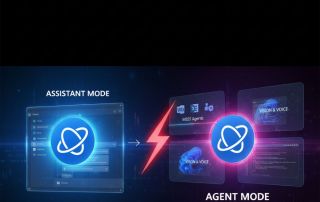A quiet farewell: Why the end of Google Assistant was inevitable
Do you remember the classic “Hey Google, what’s the weather like?” and the robotic reply that followed? Today, in late autumn 2025, it seems like a relic from a bygone era. The Google Assistant, once the heart of the Android ecosystem and the mastermind behind millions of smart homes, is effectively history.
It wasn’t shut down with a bang, but rather replaced by a gradual yet radical evolution. Its successor, Gemini, has completely taken over. But why did the faithful assistant have to make way? A look at the transformation.

From order receiver to thought partner
The original Google Assistant (launched in 2016) was based on a simple principle: command and execution. It was a master at running scripts.
- “Set the timer for 10 minutes.”
- “Play music on Spotify.”
The problem? It didn’t understand the world. It only understood keywords. As soon as a question became more complex or required context (“Do you remember the restaurant my brother recommended last week?”), the old Assistant hit a wall.
The turning point: With the rise of Large Language Models (LLMs) in 2023 and 2024, user expectations changed dramatically. We no longer wanted to dictate; we wanted to converse. Google realized that the Assistant’s old code base was incapable of providing this cognitive flexibility. It had to die so that Gemini could live.
The difficult transition phase (2024–2025)
The transition was anything but smooth at first. Many users will remember 2024, when Google began pushing Gemini on smartphones.
- The latency problem: Initially, Gemini took too long to do simple things like turn on the lights because the request had to be routed through massive cloud models.
- Loss of functionality: Popular, niche Assistant features (like certain routines or third-party integrations) suddenly stopped working.
But today, at the end of 2025, the situation has changed dramatically. Thanks to more powerful NPUs (Neural Processing Units) in modern smartphones (like the Pixel 10 series) and optimized “Gemini Nano” models, most standard commands run locally and lightning fast. The gap between “intelligence” and “speed” has closed.
What we have today: Context is king
The crucial difference between the outdated Assistant and today’s AI standard is multimodal context.
If you look at your phone today and say, “What kind of building is that over there, and is it still open?”, the AI (Gemini) analyzes the camera image, recognizes your location, checks the opening hours, and answers in context. The old Assistant would have simply given you a list of Google search results for the word “building.”
In the smart home, the end of the Assistant means we no longer have to speak like programmers:
- Old: “Hey Google, turn the living room lights down to 50% and play the Jazz playlist.”
- New (2025): “I’m in the mood for a relaxing evening, make it cozy.” – The AI understands the intention, dims the lights, selects suitable music, and might even lower the blinds.
A Look Back: The Legacy of the Assistant
Should we be sad? A little nostalgia is allowed. The Google Assistant made voice control accessible to the masses. It was reliable in its simplicity. There was a time when we knew exactly what it could and couldn’t do. But the tech industry never stands still. The Assistant was a tool of “Web 2.0″—a voice interface for Google Search. Today’s system is an agent. It doesn’t just execute; it plans and acts proactively.
Key milestones of the transition
| Year | Event | Meaning |
|---|---|---|
| 2016 | Start Google Assistant | The beginning of mass-market voice control. |
| 2023 | Bard / Gemini announcement | The beginning of generative AI at Google. |
| 2024 | Gemini replaces the Assistant app | The first step towards replacing it with Android. |
| 2025 | Full integration | Smart speakers and Nest devices primarily run on an LLM basis. |
Conclusion: The king is dead, long live AI!
The term “Google Assistant” might still pop up here and there in old settings menus, but as a product, it no longer exists. It has been absorbed. The end of Google Assistant marks the moment when computers ceased to be rigid machines and began to truly understand us.
It wasn’t a death by failure, but by obsolescence. We traded the Assistant for a partner.
Beliebte Beiträge
From assistant to agent: Microsoft’s Copilot
Copilot is growing up: Microsoft's AI is no longer an assistant, but a proactive agent. With "Vision," it sees your Windows desktop; in M365, it analyzes data as a "Researcher"; and in GitHub, it autonomously corrects code. The biggest update yet.
Never do the same thing again: How to record a macro in Excel
Tired of repetitive tasks in Excel? Learn how to create your first personal "magic button" with the macro recorder. Automate formatting and save hours – no programming required! Click here for easy instructions.
IMAP vs. Local Folders: The secret to your Outlook structure and why it matters
Do you know the difference between IMAP and local folders in Outlook? Incorrect use can lead to data loss! We'll explain simply what belongs where, how to clean up your mailbox, and how to archive emails securely and for the long term.
Der ultimative Effizienz-Boost: Wie Excel, Word und Outlook für Sie zusammenarbeiten
Schluss mit manuellem Kopieren! Lernen Sie, wie Sie Excel-Listen, Word-Vorlagen & Outlook verbinden, um personalisierte Serien-E-Mails automatisch zu versenden. Sparen Sie Zeit, vermeiden Sie Fehler und steigern Sie Ihre Effizienz. Hier geht's zur einfachen Anleitung!
Microsoft 365 Copilot in practice: Your guide to the new everyday work routine
What can Microsoft 365 Copilot really do? 🤖 We'll show you in a practical way how the AI assistant revolutionizes your daily work in Word, Excel & Teams. From a blank page to a finished presentation in minutes! The ultimate practical guide for the new workday. #Copilot #Microsoft365 #AI
Integrate and use ChatGPT in Excel – is that possible?
ChatGPT is more than just a simple chatbot. Learn how it can revolutionize how you work with Excel by translating formulas, creating VBA macros, and even promising future integration with Office.

































